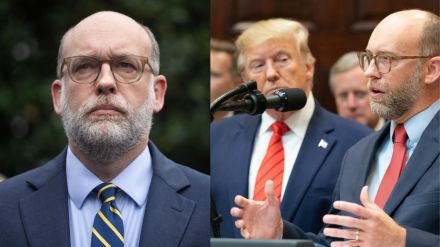US government shutdown is all set to enter its third day. Many workers are furloughed and Trump administration is already hinting at mass layoffs.
However, there is one person who can now decide the fate of the shutdown, White House Budget Director, Russel Vought.
Known as the architect of the controversial Project 2025, Vought is now has power in determining which federal programs and employees stay or go during the shutdown. But who exactly is Russel Vought, and how did he come to be in this major role?
Vought’s rise to power
Russel Vought, 49, has been a central figure in the Trump administration’s ambitious attempts to reshape the US government.
A graduate of Wheaton College and George Washington University Law School, Vought built his career in conservative circles, eventually becoming one of President Trump’s most trusted allies.
Raised in Trumbull, Connecticut, by his parents, a US Marine Corps veteran and an elementary school teacher, Vought has long championed the role of family and faith in shaping his worldview. He is married and has two daughters.
In addition to his role as OMB Director, Vought is credited with co-authoring Project 2025, a far-right blueprint aimed at drastically reforming the US government.
As per the project, it calls for sweeping cuts to federal agencies, including the Departments of Education and Commerce, and a massive overhaul of the executive branch.
Vought’s influence within the Trump administration grew through his work with conservative think tanks, which he founded after leaving the White House in 2021.
It was here that he helped draft the principles that would later become Project 2025, which advocates for slashing government spending, mass layoffs of federal employees, and pushing forward a hardline, conservative agenda.
During the 2024 election cycle, Trump distanced himself from the project, likely as a strategy to appeal to more moderate voters.
However, after his victory in 2024, Trump reversed course, embracing Vought’s vision and appointing him as OMB Director once again.
Vought’s role in the shutdown
With the shutdown affecting federal employees and key government functions, Vought is making critical decisions on what stays and what goes.
He is overseeing decisions on whether furloughed federal employees will be permanently laid off, instead of the usual practice of temporary furloughs.
Vought announced that $18 million in transportation funding for New York projects, including those in the districts of Senate Democratic Leader Chuck Schumer and House Democratic Leader Hakeem Jeffries, would be withheld.
This was only the beginning. The following day, Vought announced the cancellation of nearly $8 billion in Green New Deal funding for projects in 16 Democrat-led states, a move that directly targets Democratic priorities.
One of Vought’s key policy beliefs is that Congress should set a ceiling for government spending, but that the president should ultimately decide how and where that money is spent. This vision aligns closely with Project 2025, which calls for dismantling existing government structures and centralising decision-making power in the executive branch.
Vought’s approach to federal spending has drawn sharp criticism, particularly for his stance on bypassing congressional restrictions on funding.
During his Senate confirmation hearings in 2025, Vought faced bipartisan criticism when he refused to commit to following congressional spending laws, instead asserting that he would follow President Trump’s directives, as Trump had described many of the existing restrictions as unconstitutional.
Vought’s influence has expanded as he has increasingly guided the shutdown narrative, dictating which agencies are essential and which will face cuts.
He has instructed agencies to prepare for mass layoffs, threatening job losses for thousands of federal employees whose work does not align with the President’s priorities.
The White House has even suggested that some of the cuts may be permanent, which could change the landscape of federal employment for years to come.
